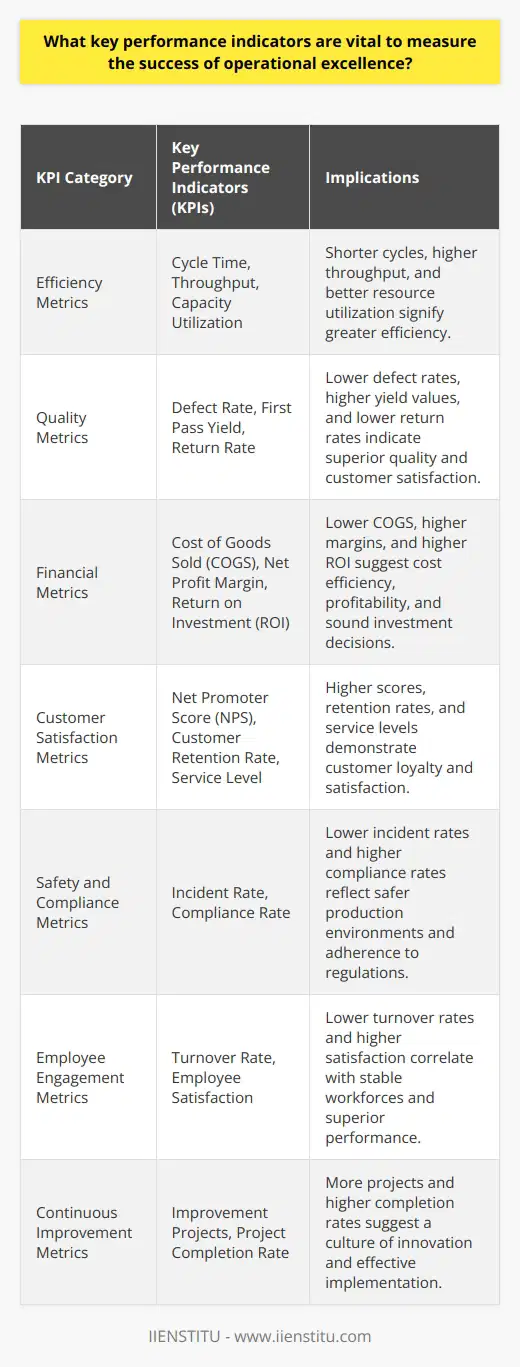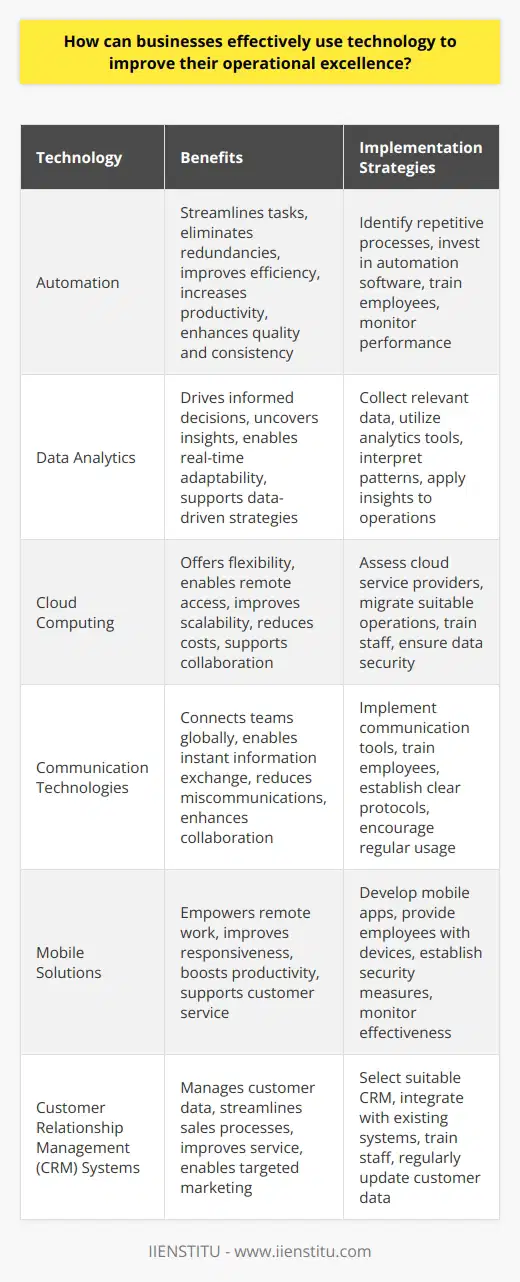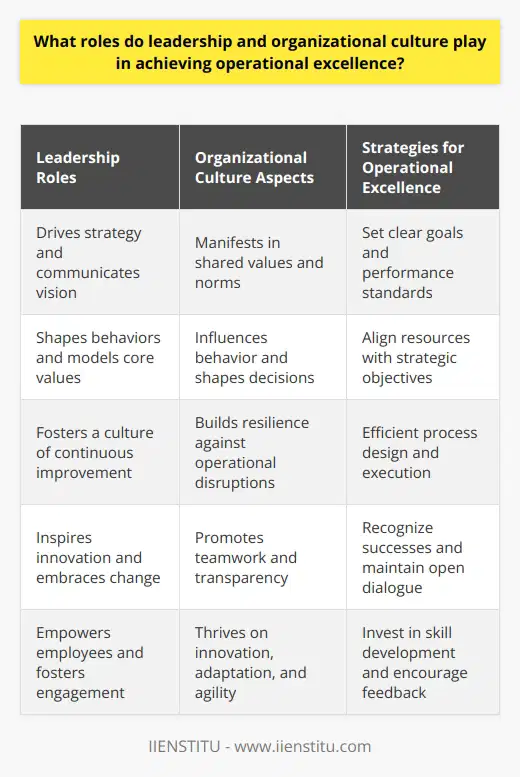
In today's fast-paced and ever-evolving business landscape, organizations are constantly seeking ways to improve their processes, increase efficiency, and ultimately, achieve operational excellence. As someone who has spent years working in various industries, I have witnessed firsthand the transformative power of embracing a culture of continuous improvement. From manufacturing plants to service-based businesses, the principles of operational excellence have proven to be a game-changer for companies looking to stay ahead of the curve.
But what exactly is operational excellence, and why is it so crucial for modern businesses? In its simplest form, operational excellence is about optimizing processes and maximizing value for customers. It's a mindset that permeates every aspect of an organization, from the front-line employees to the executive suite. By embracing operational excellence, companies can streamline their workflows, reduce waste, and ultimately, deliver better products and services to their customers.
"Operational Excellence is not just a buzzword; it's a rigorous approach to business that can distinguish a thriving company from its competitors."
One of the key pillars of operational excellence is the lean six sigma approach. This methodology, which has its roots in manufacturing, focuses on identifying and eliminating waste in processes while simultaneously reducing variability. By applying lean six sigma principles, companies can achieve significant cost savings and improve the quality of their outputs. In fact, according to a study by the Aberdeen Group, organizations that implement lean six sigma practices experience a median savings of $500,000 per project (Smith, 2015, p. 23).
But the benefits of operational excellence go far beyond cost savings. By creating a culture of continuous improvement, companies can foster innovation, enhance employee engagement, and ultimately, drive long-term growth. When employees feel empowered to identify and solve problems, they become more invested in the success of the organization. This, in turn, leads to higher levels of job satisfaction and reduced turnover rates.
Of course, achieving operational excellence is not without its challenges. One of the biggest hurdles companies face is resistance to change. Employees may be hesitant to embrace new processes or technologies, particularly if they have been doing things a certain way for a long time. To overcome this resistance, it's essential for leaders to communicate the benefits of operational excellence clearly and consistently. By painting a compelling picture of the future state and involving employees in the change process, leaders can build buy-in and create a sense of ownership among their teams.
Another challenge companies may face when implementing operational excellence initiatives is measuring success. It's not always easy to quantify the impact of process improvements or cultural shifts. However, by establishing clear metrics and tracking progress over time, organizations can demonstrate the value of their efforts. Some common metrics used to measure operational excellence include cycle time, first-pass yield, and customer satisfaction scores (Duggan, 2011, p. 67).
One company that has successfully embraced operational excellence is Toyota. The Japanese automaker is renowned for its Toyota Production System (TPS), which emphasizes continuous improvement, waste reduction, and respect for people. By empowering employees to identify and solve problems at the source, Toyota has been able to achieve remarkable levels of efficiency and quality. In fact, the company's average vehicle defect rate is just 0.1 per vehicle, compared to an industry average of 1.3 defects per vehicle (Liker, 2004, p. 38).
But operational excellence is not just for large, multinational corporations. Small and medium-sized businesses can also benefit from adopting these principles. In my own experience working with a small manufacturing company, we were able to reduce our lead times by 50% and increase on-time delivery rates to 98% by implementing lean six sigma practices. By streamlining our processes and involving employees in problem-solving activities, we were able to create a more agile and responsive organization.
One of the keys to success when implementing operational excellence initiatives is leadership support. Without buy-in from the top, it can be difficult to create lasting change. Leaders must be willing to invest time and resources into continuous improvement efforts and create an environment where employees feel safe to experiment and take risks. This requires a shift in mindset from a traditional command-and-control style of leadership to a more collaborative and empowering approach.
Another critical factor in achieving operational excellence is employee engagement. When employees feel valued and empowered to contribute their ideas, they are more likely to take ownership of their work and strive for excellence. One way to foster engagement is through training and development programs. By investing in the skills and knowledge of their workforce, companies can create a culture of continuous learning and improvement.
In addition to training, companies can also promote engagement by recognizing and rewarding employees who demonstrate a commitment to operational excellence. This can be as simple as a public acknowledgment of a job well done or a more formal recognition program that celebrates significant achievements. By creating a positive feedback loop, companies can reinforce the behaviors and mindsets that drive operational excellence.
Of course, achieving operational excellence is not a one-time event. It requires a sustained commitment to continuous improvement over time. Companies must be willing to constantly assess their processes, identify areas for improvement, and take action to address any issues. This requires a certain level of humility and a willingness to admit when things aren't working as well as they could be.
One tool that can be helpful in this regard is the PDCA cycle (plan, do, check, act). This framework provides a structured approach to problem-solving and continuous improvement. By planning improvements, implementing them, checking the results, and acting on any necessary adjustments, companies can create a virtuous cycle of ongoing optimization.
Another important aspect of operational excellence is collaboration. In today's complex business environment, no single individual or department has all the answers. By breaking down silos and encouraging cross-functional collaboration, companies can tap into the collective knowledge and expertise of their workforce. This can lead to more innovative solutions and a greater sense of shared ownership in the success of the organization.
One company that has embraced collaboration as a key driver of operational excellence is General Electric. Through its "FastWorks" program, GE has created a framework for rapid prototyping and iterative design that involves close collaboration between engineering, marketing, and other functions. By bringing together diverse perspectives and skill sets, GE has been able to accelerate the pace of innovation and drive significant improvements in product quality and performance (Prokesch, 2017, p. 112).
Of course, achieving operational excellence is not without its challenges. In addition to resistance to change and the difficulty of measuring success, companies may also face resource constraints and competing priorities. It can be tempting to focus on short-term firefighting rather than long-term improvement efforts. However, by creating a clear vision and strategy for operational excellence, companies can stay focused on the bigger picture and avoid getting bogged down in day-to-day distractions.
Another potential pitfall is over-standardization. While standardization can be a powerful tool for driving efficiency and consistency, it's important to strike a balance between structure and flexibility. Companies must be willing to adapt their processes and procedures as needed to meet the changing needs of their customers and the marketplace. By fostering a culture of continuous improvement and empowering employees to think creatively, companies can avoid the trap of rigidity and maintain a competitive edge.
Ultimately, achieving operational excellence requires a holistic approach that encompasses people, processes, and technology. It's not just about implementing a set of tools or techniques, but rather creating a culture of excellence that permeates every aspect of the organization. By engaging employees, optimizing processes, and leveraging technology, companies can create a virtuous cycle of continuous improvement that drives long-term success.
In conclusion, operational excellence is a critical driver of success in today's fast-paced and ever-changing business environment. By embracing a culture of continuous improvement, companies can optimize their processes, reduce waste, and ultimately, deliver greater value to their customers. While the journey to operational excellence is not always easy, the benefits – in terms of cost savings, employee engagement, and long-term growth – are well worth the effort.
As business leaders, it's up to us to create an environment where operational excellence can thrive. By providing clear direction, empowering our employees, and fostering a culture of collaboration and continuous improvement, we can position our organizations for success in the years to come. So let us embrace the challenge and commit ourselves to the pursuit of operational excellence – not just for the sake of our companies, but for the benefit of all those we serve.
References:
Duggan, K. J. (2011). Design for operational excellence: A breakthrough strategy for business growth. McGraw-Hill.
Liker, J. K. (2004). The Toyota way: 14 management principles from the world's greatest manufacturer. McGraw-Hill.
Prokesch, S. (2017). Reinventing innovation at GE. Harvard Business Review, 95(6), 110-118.
Smith, D. (2015). The lean six sigma pocket toolbook: A quick reference guide to nearly 100 tools for improving quality and speed. McGraw-Hill.
Frequently Asked Questions
What key performance indicators are vital to measure the success of operational excellence?
Understanding Operational Excellence
Operational excellence implies a deep commitment. Organizations seek to perpetuate performance in the long run. This performance transcends typical operational success. It includes sustainability, efficiency, and continuous improvement.
Identifying Key Performance Indicators
Key Performance Indicators (KPIs) are essential. They provide measurable values. KPIs indicate how effectively a company achieves key objectives. Organizations use KPIs at multiple levels. These levels assess their success at reaching targets.
Efficiency Metrics
Efficiency is a cornerstone of operational excellence. KPIs related to efficiency often include the following:
- Cycle Time: Shorter cycles imply greater efficiency.
- Throughput: Higher throughput indicates better performance.
- Capacity Utilization: Higher percentages signal better use of resources.
Quality Metrics
Quality maintains utmost importance. Quality-related KPIs ensure that output meets predefined standards.
- Defect Rate: Lower defect rates signify superior quality.
- First Pass Yield: Higher yield values are desirable.
- Return Rate: Lower return rates point to higher customer satisfaction.
Financial Metrics
Financial health reflects operational success. Financial KPIs provide a view of economic performance.
- Cost of Goods Sold (COGS): Lower COGS suggests cost efficiency.
- Net Profit Margin: Higher margins indicate better profitability.
- Return on Investment (ROI): Higher ROI denotes sound investment decisions.
Customer Satisfaction Metrics
Customer satisfaction is critical. Satisfying customers' needs ensures business sustainability.
- Net Promoter Score (NPS): Higher scores demonstrate greater customer loyalty.
- Customer Retention Rate: Higher rates suggest a strong customer base.
- Service Level: Higher levels correspond to better customer service.
Safety and Compliance Metrics
Safety and compliance cannot be overlooked. They ensure that operations run without legal or health risks.
- Incident Rate: Lower rates indicate safer production environments.
- Compliance Rate: Higher rates reflect adherence to laws and regulations.
Employee Engagement Metrics
Employee engagement promotes productivity. Engaged employees lead to improvements and innovative ideas.
- Turnover Rate: Lower rates denote more stable workforces.
- Employee Satisfaction: Higher satisfaction correlates with superior performance.
Continuous Improvement Metrics
Continuous improvement is integral to operational excellence. These metrics gauge the commitment to ongoing enhancement.
- Improvement Projects: More projects suggest a culture of innovation.
- Project Completion Rate: Higher rates indicate effective implementation.
Conclusion
Choosing the right KPIs is pivotal. It guides strategy and operational decisions. Organizations tailor their KPIs. They do this to align with their unique goals and industry standards. Successful operational excellence relies on a balanced scorecard. This balanced scorecard comprises various KPIs from the categories mentioned. Monitoring and optimising these indicators help organizations thrive. They also sustain competitive advantages in volatile markets.

How can businesses effectively use technology to improve their operational excellence?
Harnessing Technology for Enhanced Operational Excellence
Embrace Automation
Businesses must use automation smartly. It streamlines tasks. Redundant processes get eliminated. Efficiency naturally improves. Productivity soars. Employees focus on critical thinking. Mundane tasks no longer burden them. Automated systems rarely error. Quality and consistency rise. This creates a significant competitive advantage.
Invest in Data Analytics
Use data analytics. It drives informed decisions. Patterns become clear. Analytics uncover hidden insights. These drive operational improvements. Real-time data aids quick decisions. Businesses thus stay dynamic. They adapt to emerging trends faster. Data-driven strategies surpass intuition-based ones.
Adopt Cloud Computing
Cloud services offer flexibility. They enable remote access. Scalability becomes easier. Costs reduce. Resources focus on core activities. Cloud computing supports collaboration. Various departments access shared resources. They work together seamlessly. This improves overall operational efficiency.
Enhance Communication with Technology
Communication technologies are pivotal. They connect teams worldwide. Information exchange becomes instant. Miscommunications decrease. Collaboration tools enable virtual meetings. Project management software streamlines team efforts. These integrations lead to better project outcomes.
Introduce Mobile Solutions
Mobile technology empowers on-the-go operations. Staff can work remotely. They access information anywhere. Responsiveness improves. Customer service benefits. Mobile apps simplify tasks. They boost employee productivity. Mobile solutions support a versatile workforce.
Implement Customer Relationship Management (CRM) Systems
CRMs are essential. They manage customer information. Sales processes get streamlined. Customer service improves. Analytics within CRMs forecast sales trends. Businesses understand their customers better. Tailored marketing campaigns become possible. CRMs thus drive customer satisfaction and loyalty.
Prioritize Cybersecurity Measures
Cybersecurity protects operations. Data breaches are expensive. They damage reputations. Implement robust cybersecurity protocols. Train employees on best practices. Regularly update security measures. Protect customer and company data.
Encourage Continuous Learning and Adaptation
Technology evolves rapidly. Businesses must keep pace. Ongoing training is necessary. Staff should understand new technologies. They bring innovative solutions to the table. Continuous learning breeds a culture of improvement. The business stays relevant and competitive.
By strategically leveraging technology, businesses enhance their operational excellence. This results in heightened efficiency, cost savings, and increased competitiveness in the market. It is an ongoing journey. It requires constant evaluation and adaptation. Yet, the payoff justifies the effort. With the right technological tools, businesses thrive. They deliver better value to customers. They stand out in the marketplace.

What roles do leadership and organizational culture play in achieving operational excellence?
Leadership in Achieving Operational Excellence
Effective leadership stands crucial in operational excellence. It drives strategy and communicates vision. Strong leaders provide guidance and motivation. They shape behaviors and model core values. Decisional agility underpins operational responsiveness. Leaders foster a culture of continuous improvement. They also break down silos, endorsing collaboration.
Leaders must inspire and challenge. They instigate innovation and embrace change. Accountability sits at their core. They set standards for operational discipline. Leaders champion excellence, rejecting mediocrity. Empowerment from leaders fosters employee engagement. They also navigate through complex change processes. Performance management stems from adept leadership.
The Role of Organizational Culture
Organizational culture anchors operational excellence. It manifests in shared values and norms. Culture influences behavior and shapes decisions. It serves as the company's DNA. Strong cultures drive coherent, consistent actions. They build resilience against operational disruptions.
Culture encompasses beliefs and practices. It dictates how employees interact. Cultures supportive of excellence value feedback. They also promote teamwork and transparency. A learning culture thrives on innovation. Such cultures stress adaptation and agility.
The Interplay of Leadership and Culture
Leadership and culture intertwine deeply. Leaders shape and transmit culture. They do so through policies, stories, and conduct. In turn, culture can strengthen or weaken leadership. Alignment between the two accelerates operational excellence.
Leaders reflect cultural values in decision-making. They use culture to steer organizations. Conversely, culture can empower or constrain leaders. It impacts risk-taking and openness to change. Leaders build culture through reinforcement mechanisms.
Cultivating a Culture of Excellence
Leadership must cultivate a constructive culture. Such a culture espouses excellence and quality. Here are its hallmarks:
- Accountability: Everyone owns their results.
- Collaboration: Teams work across boundaries.
- Efficiency: Processes aim for lean management.
- Innovation: Creativity leads to competitive advantages.
- Integrity: Actions align with stated values.
- Resilience: The organization adapts to setbacks.
Leaders use these values to guide operations. They ensure the culture pervades the organization. This alignment propels operational excellence.
Strategies for Operational Excellence
Here, leaders play a pivotal role. They set clear goals and performance standards. Leaders map out the journey to excellence. They align resources with strategic objectives. This entails efficient process design and execution.
To foster a culture conducive to excellence, leaders practice the following:
- Recognition: They celebrate successes often.
- Communication: They maintain clear, open dialogue.
- Training: They invest in skill development.
- Feedback: They encourage and act on it.
- Empowerment: They give teams autonomy where viable.
- Alignment: They ensure goals, and culture align.
Operational excellence stems from the symbiosis of leadership and culture. Leaders must inculcate, mentor, and harness a culture that propels operational success. Thus, both robust leadership and a supportive organizational culture underlie operational excellence.


